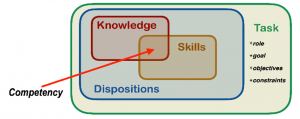Worldwide, approximately 4% of university graduates continue to graduate school. That means approximately 96% of university graduates enter the workplace. Are computing and engineering graduates competent for this transition?
Industry-Education Related Resources
This aspect of the DEAP project provides valuable industry educational resources for employers, students, teachers, and administrators. The content includes articles and papers generated from the CC2020 project and report, industry-education datasets affecting computing, engineering, and education in general, and other reports, papers, and literature related to industry and education.
Computing Curricula 2020 (CC2020)
Competency and Computing/Engineering Education
Industry and Computing Education
Industry and Engineering Education
Industry-Education Datasets
Industry-Education Opportunities
Industry-Education Miscellaneous Works
Competency from the CC2020 Report
Competency in a professional sense requires three components: knowledge, skills, and dispositions, taken in context in performing a task. Knowledge is the “know-what” dimension of competency as a factual understanding. Skills introduce the capability of applying knowledge to accomplish a task actively. Dispositions frame the “know-why” dimension of competency and prescribe a temperament of character quality in task performance. The following figure is a “Conceptual Structure of the CC2020 Competency Model”) illustrates the meaning of competency as shown in the CC2020 report.
 Unlike in years past, employers today expect a hire to be productive almost on day one. Hence, computing and engineering graduates must be competent in their specialty by graduation. Even if baccalaureate graduates wish to pursue studies for a master’s or doctoral degree, being competent and pressing the three components of competency can only be an asset in their favor. Therefore, transitioning from knowledge-based to competency-based learning benefits students, employers, and entrepreneurs.
Unlike in years past, employers today expect a hire to be productive almost on day one. Hence, computing and engineering graduates must be competent in their specialty by graduation. Even if baccalaureate graduates wish to pursue studies for a master’s or doctoral degree, being competent and pressing the three components of competency can only be an asset in their favor. Therefore, transitioning from knowledge-based to competency-based learning benefits students, employers, and entrepreneurs.
